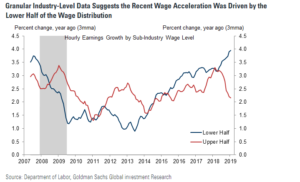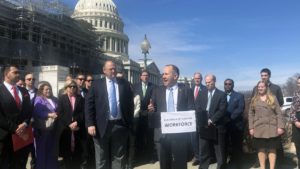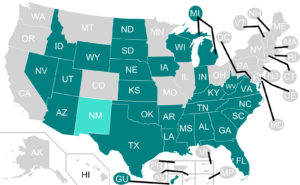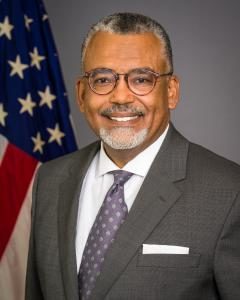Labor Related Articles

After a recent election at Elon University in North Carolina, where 56% of voting faculty members selected the Service Employees International Union (SEIU) to represent them, Elon filed 6 objections to the election. The objections accused the union of
- posing as students to gain access to faculty conversations;
- promising ballots only to those who favored the union;
- coercing faculty members into supporting the SEIU with false information
- undermining Elon’s representative and transparent shared governance system; and
- stalking, bullying, and outright lying to Elon faculty.
The National Labor Relations Board has delayed certifying the results of this election until they have finished an investigation of the accusations, at which point SEIU could face litigation over their behavior if the charges are not dismissed.
Read more about it here.

According to a recent Goldman Sachs report, wages have accelerated in recent months, with a cycle-high pace of 3.4%. The Indeed Hiring Lab has also stated that “In January 2019, wages grew by 3.2% year-over-year, up from the general 2.6-2.8% range wage growth had been hovering from mid-2016 to mid-2018.”
Both reports point to lower wage brackets as the beneficiaries of this increase, a trend that is expected to continue into the future.
Read more about these reports, as well as an analysis of their findings on the American Enterprise Institute’s website here.

U.S. Rep. Lloyd Smucker (R-Pa.) has introduced two new bills to develop the country’s workforce, the USA Workforce Tax Credit Act and the Workforce for an Expanding Economy Act, which are aimed at filling the country’s 6.6 million available jobs.
The USA Workforce Tax Credit Act would provide a tax credit of up to $2 billion to encourage apprenticeships, education, workforce development, and K-12 educational preparedness.
The Workforce for an Expanding Economy Act would create an immigration visa system for less-skilled workers to do year-round, non-farm work. These visa workers would only be allowed to work for an approved employer at a specific approved location and for a specific job.
Read more about the proposed bills here.

Decertification of a union is nearly impossible for employees to achieve under the Railway Labor Act (RLA). An existing “Straw Man” procedure makes the process confusing and intimidating, requiring employees of a given class — pilots, baggage handlers, etc. — to run an RLA representative with at least 50 percent of employee signatures to force an election against a union. Instead of trying to win, the Straw Man must then convince employees to vote “no representative” to decertify the union.
The National Mediation Board (NMB) has proposed a new rule change that will simplify this process and make the waiting period for union votes more consistent and employee friendly.
Read more about the rule change in my recent article, published in the Washington Examiner here.

In 1947, the Taft-Hartley Act amended the National Labor Relations Act (NLRA) to allow states to enact right-to-work statutes. 28 states have since adopted those laws (state-wide laws are pictured above in green; blue holds local right-to-work laws), and union membership has been declining since. In the 1950s, 35 percent of the workforce held union memberships. That figure declined to 10.7 in 2017. Now the unions want to fight back by reversing decades of reform.
In 2018, two bills were introduced in Congress to roll back right-to-work laws: the Workplace Democracy Act and the Workers’ Freedom to Negotiate Act. The Workplace Democracy Act attempts to ban right-to-work laws, and the Workers’ Freedom to Negotiate Act would require nonunion employees to pay agency fees in right-to-work states.
Both bills are expected to be reintroduced in the new session of Congress. Read more about them here.

Mark Gaston Pearce, who had previously served as the National Labor Relations Board (NLRB) chair, has withdrawn his name from consideration for a renewed term on the Board. The pro-union Democrat served two terms under the Obama administration, and although President Trump nominated him in August to serve an additional term, the nomination expired at the end of 2018 when the Senate failed to vote on it.
“While I urge that the board return to five members so that it can continue to function with the appropriate quorum,” Pearce said, “I feel it’s best that I remove myself from the center of a political tug of war that has spanned five months.” Republicans and business advocates are pushing to keep the seat open, citing Republican vacancies during the Obama era as a precedent for maintaining a 3-1 Republican majority.
Read more about his decision here.
Articles by the RWP Team








